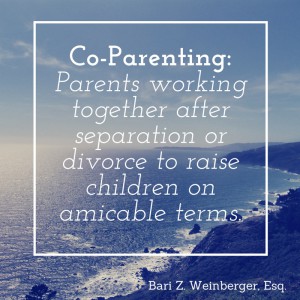High Conflict Divorce: When Co-Parenting Doesn’t Work, Try Parallel Parenting
 Co-parenting, viewed by therapists and family law professionals as the gold standard for post-divorce parenting, works when both parents are willing and able to set aside their personal grievances and support their child’s relationship with the other parent. To do this, both parents need to be able to communicate calmly, follow the conditions of the custody and child support order, and agree on a plethora of child-related issues such as medical care, education, religious training, and discipline.
Co-parenting, viewed by therapists and family law professionals as the gold standard for post-divorce parenting, works when both parents are willing and able to set aside their personal grievances and support their child’s relationship with the other parent. To do this, both parents need to be able to communicate calmly, follow the conditions of the custody and child support order, and agree on a plethora of child-related issues such as medical care, education, religious training, and discipline.
Negotiating child rearing is a tall order, even for two people who love each other. It’s an even taller order for two reasonably well-adjusted people whose irreconcilable differences have led them to end their marriage. But if both people are determined to keep their children off the battleground of their divorce, they can usually learn the skills necessary to become successful co-parents.
High-conflict personalities, however, frequently lack the motivation to co-parent because, by definition, they are unable to work through their anger at the other party.
These individuals tend to focus instead on minor mistakes the other parent may have made and typically interpret these as “proof” of that person’s incompetence and inability to raise the children. They can also manipulate their children into aligning with them against their former spouse. In many cases, high-conflict personalities have no compunction about raising kids in a war zone because their need to punish the other parent trumps the children’s well-being.
If one parent is determined to destroy his or her child’s relationship with the other parent, the situation may be so severe that no one — including therapists, custody evaluators, and parenting experts — will be able to convince this person otherwise. In these kinds of high-conflict situations, co-parenting may indeed be the wrong goal. So if co-parenting doesn’t work, what alternative could your divorce attorney suggest for structuring your parenting time plan?
Parallel parenting.
Parallel parenting is an arrangement in which divorced or separated spouses are able to parent by means of disengaging from each other, and having limited direct contact, in situations where they have demonstrated that they are unable to communicate with each other in a respectful manner. Choosing parallel parenting over co-parenting doesn’t mean you’ve failed. If you are engaged in a high-conflict situation, embracing parallel parenting can signal that you have accepted reality and are willing to adopt a different paradigm designed to minimize interaction with a hostile ex so you can parent effectively.
Here are four ways to do just that:
Set boundaries for communication
Hostile exes frequently use e-mail, phone, and texts as weapons. This kind of communication is usually not intended to deliver information; it’s intended to elicit an emotional reaction. Because it’s particularly easy to get defensive on the phone, when you can’t take back what you say, try to stick to electronic communication. In parallel parenting arrangements, e-mails and texts are typically used only to exchange logistics directly related to the children: dentist appointments, playdates, travel plans. If you find yourself ready to fire off an angry retort after receiving yet another condescending electronic missive, take a break and return to your e-mail when you’ve cooled off. Your attorney can help you come with workable terms related to communication that can be included in your child custody order.
Avoid each other when at all possible
It’s great if you can both be at your child’s birthday party, but not if the tension between the two of you permeates the air. The same goes for parent-teacher conferences, which are already stressful enough for kids. If there’s a history of verbal and physical abuse, and certainly if a restraining order is in place, sticking to curbside drop-offs could be best. You child is much better off never seeing both parents together than witnessing chronic hostility.
Different rules for different houses
Yes, it’s optimal to have the same rules and expectations in both households, but it may not be realistic. Unless you have reasonable suspicion of abuse, try to stop worrying about what is or isn’t going on in the other house. Having different bedtimes, babysitters, and discipline strategies probably won’t keep your child from getting into Harvard or growing up to be a well-adjusted adult. On the other hand, years of being stuck in the crossfire will likely leave a lasting negative impact on your child.
Stay out of your child’s relationship with your ex
Unless you have a legitimate reason to suspect abuse, do not run interference between your child and your ex. Even kids from intact homes try to pit parents against each other to get what they want. Don’t believe everything your child says about your ex is true, and avoid trying to “help” him by trying to control what goes on in the other parent’s house. Aligning with your child against the other parent is one of the biggest contributors to high-conflict divorce. Instead of attempting to change what your ex does, empower your child by telling him to speak to Mom or Dad directly so you don’t have to be the go-between. This will not only dampen the conflict, but it will also teach your child a valuable lesson in self-agency.
Parallel parenting should only be implemented when you’ve been unable to make co-parenting work. But that doesn’t mean you’ve failed. Done correctly, Parallel parenting can help reduce conflict, make life more enjoyable and achieve what co-parenting aims to do: keep your child out of a war zone.
Embroiled in a high-conflict divorce? Wondering if parallel parenting is for you? We can help. Please contact us to schedule your initial initial attorney consultation.


